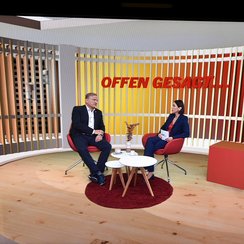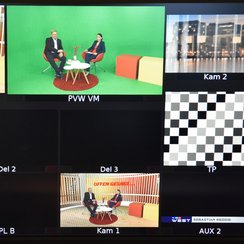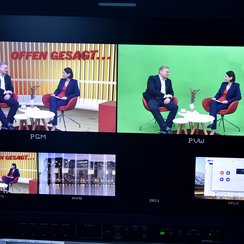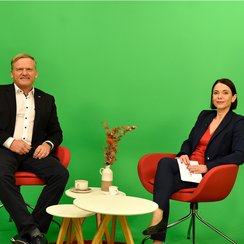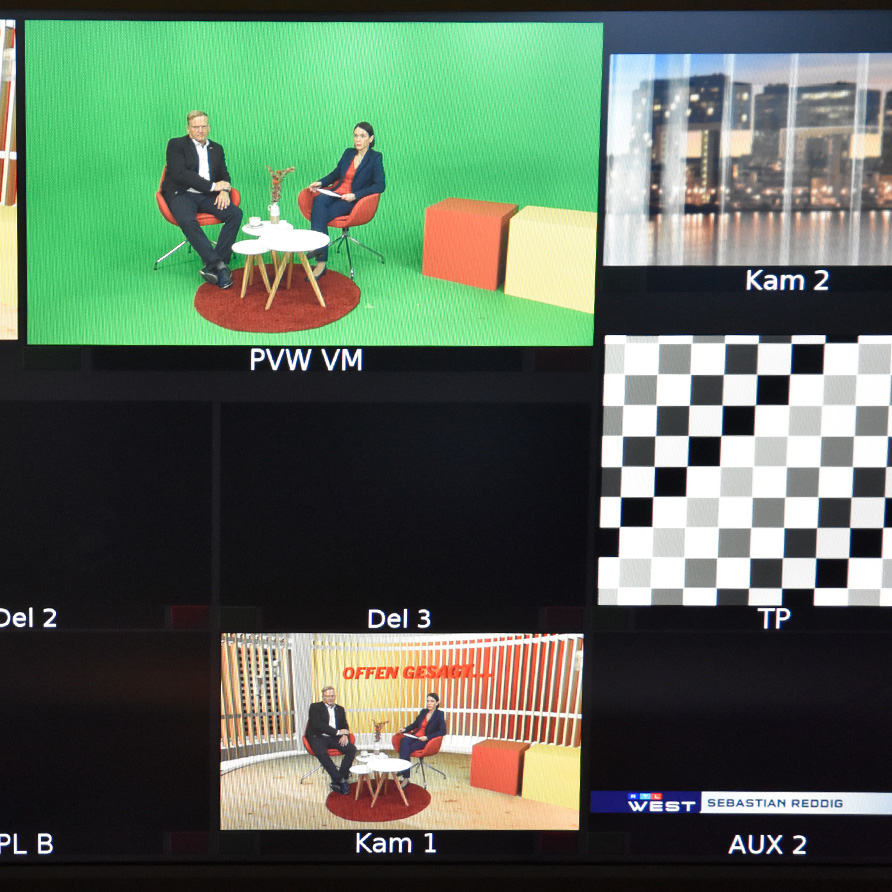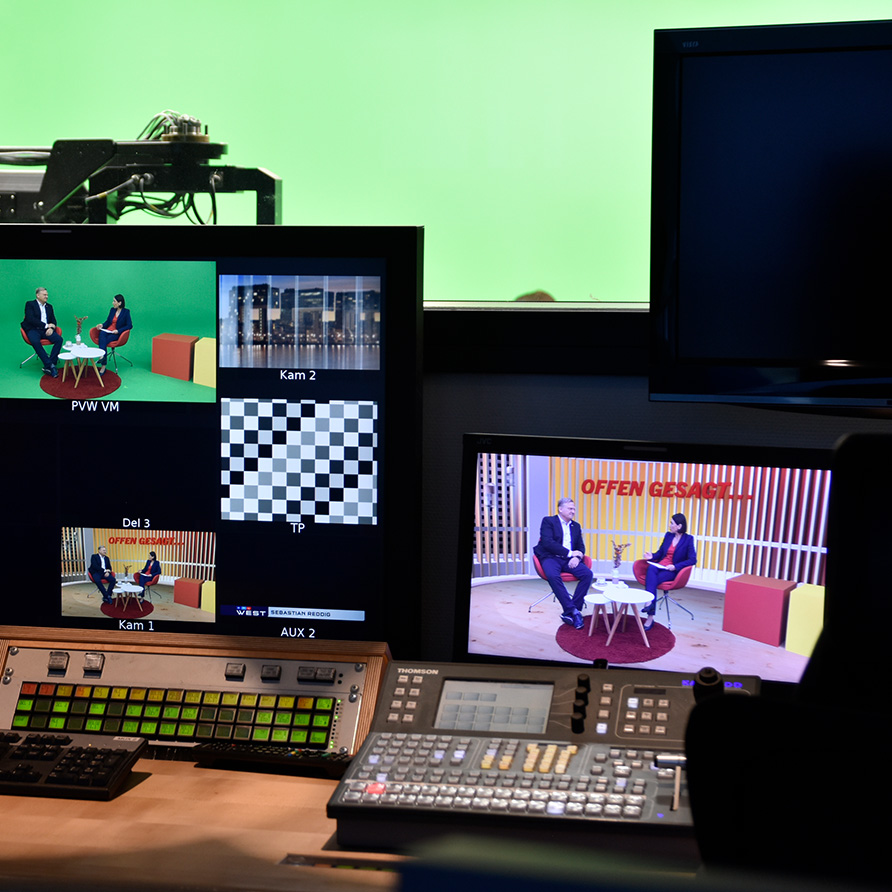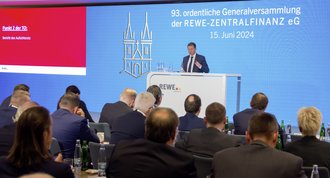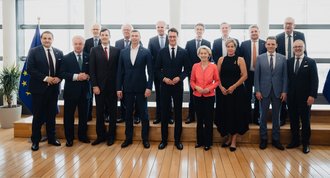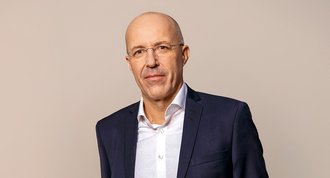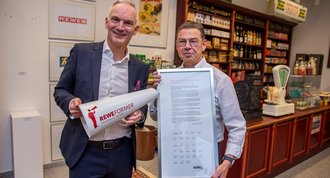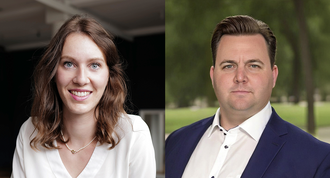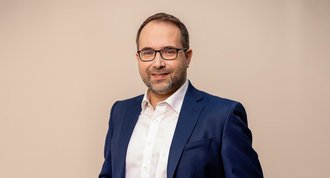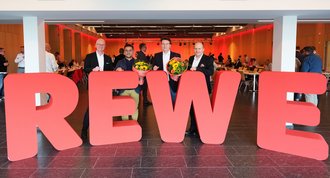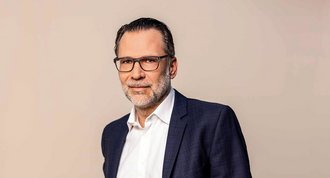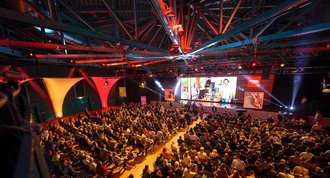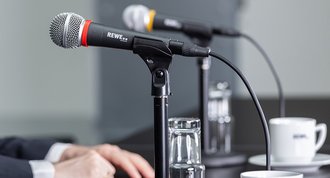Since the beginning of the year, the full-range and Logistics with Supply Chain Management have had a Chief Operating Officer on the Management Board in Peter Maly. In this interview, he talks about hospitality in the stores, synergies in logistics and why he is rooting for HSV.
one: Mr Maly, as Chief Operating Officer on the REWE Group Management Board, you have been responsible for the full-range in Germany and for logistics and supply chain across the Group since the first of January. Last year, inflation and high energy costs caused customers to increasingly turn to discounters again. Does the future belong to the discounters again?
Peter Maly: Customers are certainly more price-conscious than they have been for years. In fact, the discounters in particular have benefited from this over the past year. Nevertheless, we are doing well with our REWE stores. In recent years, REWE stores have recorded the strongest growth in the German food retail sector. The REWE brand is strong and robust, but we still have to be careful and react quickly and flexibly to the changing challenges.
First came corona, then last year the war in Ukraine with all its negative consequences such as unstable supply chains, inflation and immensely high energy prices. Customers have become more price-sensitive due to the increased cost of living And despite these negative effects, the approximately 3,700 REWE stores in Germany once again defied the crisis in 2022 and achieved a satisfactory result.
one: What are the reasons for this good result? And is the discounter still the strongest challenge for the full-range retailer?
Peter Maly: It has paid off that we tackled many things at REWE with the structural reform in 2006/2007 and rethought things. At that time, we revitalised the topics of entrepreneurship and cooperatives, made them more pronounced and placed them at the centre of our activities. In the years that followed, this has led to the development of a very special REWE culture with a broad-based opinion-forming culture. Through internal committees, this culture involves both the management and our retailers, who have formed the core of our brand as comrades for almost 100 years, as well as our store managers. Thanks to this broad, grassroots culture of discussion, we have achieved a dynamic of innovation that has continuously developed our business model, always focussing on ensuring that the decisions made are the best for customers, markets, logistics and employees. Overall, the decisions made by consensus must advance the company and ultimately be profitable. Sometimes we lose speed due to our cooperative consensus principle. That's why we have to keep our foot on the accelerator in the face of challenges such as inflation or digitalisation and continue to work hard on our efficiency, structures and improving our perception. Differentiation also plays a major role in this. Our biggest differentiators from discounters are, for example, our freshness, our service, our regional and local product ranges, our employees and our online services. For me, the discounter remains the biggest challenge. They have gained market share again. Aldi and Lidl are investing a lot of money in remodelling their stores. We always have to keep an eye on this and be quick.
„Hospitality and appreciation are two key differentiators that can inspire and retain our customers.“
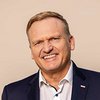
one: Other topics such as hospitality and customer orientation are important differentiators for a full-range retailer. What do we have to do to ensure that REWE customers will still be shopping with us tomorrow?
Peter Maly: An important foundation is a uniform understanding of customer orientation within the organisation. Interaction with customers is the top priority here. Today more than ever, we need to be clear about what customers want and expect so that they are satisfied, remain loyal and shop at REWE again tomorrow.
Good hostesses in the store serve with passion and friendliness, are knowledgeable and naturally know about the origin and quality of their products. We will only be good hosts if we live customer-orientation wholeheartedly and let our customers feel our appreciation and friendliness. It is therefore crucial that we find and select employees and develop them in line with these values. It is already important in the recruitment process to select employees who ideally have the "customer orientation" gene.
one: What influence does Sustainability have on the future-oriented development of the REWE business model?
Peter Maly: Sustainability has been an essential part of our corporate identity and our business strategy for well over ten years. Our goal is to establish sustainable consumption across the market, both in the composition of our product ranges and in the construction of our stores. As a pioneer in the industry, we have developed many new approaches, for example in the construction of our stores. REWE has been building green building supermarkets since 2009. With this supermarket generation of more sustainable stores, we are setting new standards for the entire industry and currently have around 250 green stores in operation. A hundred more are in the pipeline.
one: If we look into the crystal ball, what will the shopping centre of the future look like?
Peter Maly: A good example is a new building in Wiesbaden-Erbenheim that is unique in Germany and Europe, combining a supermarket, basil farm and fish farm under one roof. The architecture for this market of the future was realised using a particularly resource-conserving construction method. For us, a holistic approach to Sustainability includes not only product ranges, but also construction and operation. In our opinion, this is the right approach. After all, a sustainable retail property not only has to blend in with its surroundings, but we are also constructing buildings for people for whom sustainability is a key factor when choosing a place to shop.
one: Sustainability in the product range and in the architecture - how committed will REWE be to this in the future?
Peter Maly: The ideal store is one where our customers enjoy shopping because they feel comfortable and their needs for selection, quality, freshness, sustainability, service and convenience are taken into account. Even if we expand digital offerings such as delivery or pick-up services, bricks-and-mortar food retailers will still exist in the future. All of this also brings added value for customers: They can do their shopping via many channels, either order digitally, have it delivered or pick it up, or shop conveniently in-store. I firmly believe that we will also see far-reaching changes in the product ranges and supply chains within the next ten years: For example, the current goal is to only offer meat products from farming levels 3 and 4 by 2030. The topic of orientation and consumer education will also play a major role: guiding customers through the market in such a way that they can easily and quickly recognise what sustainable added value products offer and where they can find them on the market. I am convinced that the trends towards organic, regional and local products, as well as interest in vegan products, will continue to grow steadily.
„We remain dealers with body, soul and emotions.“

one: What role does digitalisation play in the further development of business models?
Peter Maly: Among other things, digitalisation is driving the individualisation of our markets. Customers no longer "just" buy products - they look to us to fulfil their individual lifestyles. They are looking for the retailer and the store around the corner that best suits them and their lifestyle. At the same time, their behaviour is constantly changing and their needs are becoming increasingly individual. Only those who look at the markets through the eyes of their customers and can therefore offer quasi "individualised" products will survive.
In addition, the speed of digitalisation and new business models has increased massively over the last ten years and has been further accelerated by coronavirus. Digitalisation enables and drives business models forward. We have to accept that the world has changed. In the future, no retailer will be successful on the market without modern and powerful digital technology.
In this respect, the proportion of technology will also increase for us and our business models. Nevertheless, at our core we will remain a retailer with heart, soul and emotions. Because the food retail of the future is also a people's business: people manage, advise and support. Technology supports, simplifies and enables.
one: The first fully autonomous REWE Pick&Go store opened its doors in Munich before Christmas. Customers can shop without having to go through the checkout. Will REWE abolish the job of the cashier in the medium term?
Peter Maly: Absolutely not! Our colleagues at the POS will remain the most important success factor and differentiator from the competition now and in the future. The food retail sector in our stores thrives on interaction and communication between colleagues on the shop floor and customers. The digitalisation of store processes in our stores will have major benefits for both our customers and our employees: Our customers will be able to shop faster, more conveniently and securely, and our colleagues' day-to-day work in the store will be made easier.
one: What does that mean in concrete terms?
Peter Maly: Personal customer contact from REWE employees is the top priority in order to answer questions about products, the range, offers and advice when shopping. The continuous introduction of innovations and adaptation to changing social conditions have contributed significantly to REWE's competitiveness and growth for around a hundred years and secure the jobs of all employees in the long term. Whether e-commerce offerings such as delivery and pick-up services or in-store technologies such as Scan & Go or now Pick & Go - our joint efforts and developments are focussed on the customer's shopping experience. In the fully autonomous Munich store, for example, the same number of employees work as in a conventional REWE shop. We are looking for colleagues for our stores throughout Germany who are enthusiastic about working in the food retail sector, selling and advising at our fresh food counters and in service and are looking for a secure job. We need every employee in our stores - more than ever!
„In areas such as procurement logistics, transport logistics, the automation of warehouse locations, the construction of new warehouses and the decarbonisation of the truck fleet, we want to make the expertise we have gained available to all country organisations in the Group.“

one: Since the beginning of the year, you have also been responsible for logistics and supply chain across the Group. What are your main tasks?
Peter Maly: The topics of logistics and supply chain are core processes in every retail company, which, if we look at product range management or route planning, for example, have always been very operational in nature. Within REWE, I have been responsible for logistics and supply chain management at management level for seven years. After taking a close look at and harmonising the processes within Retail Germany in recent years, we on the Management Board decided that it made sense to think about logistics and supply chain in a more holistic way, to bundle the topics and to form a large umbrella across the Group.
Essentially, the aim is to make the expertise gained in areas such as procurement logistics, transport logistics, the automation of warehouse locations, the construction of new warehouses and the decarbonisation of the truck fleet available to all country organisations in the Group. Sharing the good for the benefit of the entire organisation. If we manage to bundle the topics, evaluate them, exchange expertise and make a decision for the entire Group, we create more synergies. This is the only way we can make REWE Group fit for the future when it comes to future topics.
one: One last question: as a REWE Group Management Board member, do you have to be a fan of 1.FC Köln?
Peter Maly: No. The cooperative thrives on diversity. And that also applies to sponsorship and football enthusiasm within our company. Although we have been the shirt and main sponsor of 1. FC Köln for many years, at REWE you can also cheer or suffer with other clubs. For example, our Central sales region is a sponsoring partner of Eintracht Frankfurt and the North region supports Hamburger SV. I've been a Hamburger SV fan since I was young. It currently plays in the 2nd Bundesliga. Of course, I'm keeping my fingers crossed that both HSV will quickly be promoted back to the 1st Bundesliga and that 1.FC Köln will achieve a single-digit position in the 1st Bundesliga.
one: Thank you very much for the interview, Mr Maly.
Episode 6
"Frankly speaking" - the talk with the Management Board
In January, our newly formed Management Board took over the management of REWE Group in what continue to be turbulent times. Ines Schurin, Head of Corporate Communications, spoke to the Management Board members about their strategy, what it takes to work together and how we can remain competitive despite all the challenges in the new video format "Offen gesagt" over a hot drink of their choice.
And this is the last episode:
- 22. March Telerik Shishmanov, Management Board member for Finance
All previously published episodes of "Offen gesagt" are also available in the one_Mediathek.

